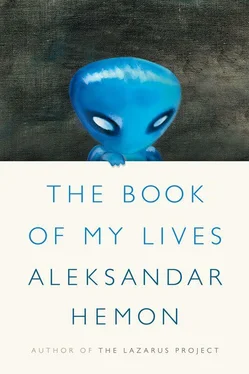For years afterward, I’d run into people who were still convinced that the birthday party was a fascist meeting, and they were as ready as ever to send us to the gallows. Understandably, I didn’t always volunteer information about my involvement. Once, up in the wilderness of a mountain near Sarajevo, while called up in the army reserve, I shared the warmth of a campfire with drunken reservists who all thought that the birthday-party people should have been at least severely beaten. And I wholeheartedly agreed — indeed I claimed, perversely, that they should’ve been strung up, and got all excited about it. Such people, I said, should be tortured at length, and my distant-cousins-in-arms nodded in bloodthirsty agreement. I became someone else at that moment. I inhabited my enemy for a short time, and it felt both frightening and liberating. Let’s drink to that, the reservists said, and we did.
The doubts about the reality of the whole thing kept nagging at me for a long time. It didn’t help matters that Isidora, now in Belgrade, did eventually become a downright, unabashed fascist. Belgrade in the nineties was fertile ground for the most virulent fascism, and she was at home there. She had public performances that celebrated the rich tradition of Serbian fascism. She dated a guy who would become a leader of a group of Serbian volunteers, cutthroats, and rapists known as the White Eagles, operating in Croatia and Bosnia at the time of the war. Later, she would write a memoir entitled The Fiancée of a War Criminal . Our friendship had long ceased, but I could not help questioning what had happened — maybe the fascist party had been concocted by her fascist part, obscure to me. Maybe I hadn’t seen, blinded by the endless possibilities of Irrelevant Poetry, what she had seen; maybe I had been a pawn in her chess musical. Maybe my life had been like one of those Virgin Marys that show up in the frozen-food section of a supermarket in New Mexico or some such place — visible only to believers, ludicrous to everyone else.
3. THE LIFE AND WORK OF ALPHONSE KAUDERS
In 1987, in the wake of the birthday-party fiasco, I started working at a Sarajevo radio station, on a program geared toward younger urban people. It was called Omladinski program (The Youth Program), and everyone there was very young indeed, with very little or no radio experience. I failed the first, spring audition as the noise from the party still echoed in the radio studios, but was accepted in the fall, despite my mumbling, distinctly unradiophonic voice. The program was given some expression leeway by the radio heads, as the times were politically changing, but also because as young nobodies we could still take a fall if need be. I reported on cultural affairs, occasionally writing invectives against government idiocy and general stupidity, then reading them on the air. Soon I moved on to producing haughty film and book reviews in a voice of unquestionable (and unfounded) expertise.
All along, I was writing very short fiction. At some point I demanded and was given three or four minutes a week, which I used to air my stories on my friends Zoka and Neven’s (now in Brno and London, respectively) pretty popular show. The time slot was called “Sasha Hemon Tells You True and Untrue Stories” (SHTYTUS). Some of the fiction embarrassed my family — already thoroughly embarrassed by the whole birthday-party debacle — because I had a series of stories about my cousin, a Ukrainian, in which he, for example, somehow lost all his limbs and lived a miserable life, until he got a job in a circus, where, night in, night out, elephants rolled him around the ring like a ball.
Around that time, I wrote the story “The Life and Work of Alphonse Kauders.” It was evident to me that it would be hard to publish, as it made fun of Tito, contained a lot of lofty farts and low sex, and involved the characters of Hitler and Goebbels and such. Moreover, most of the literary magazines in Yugoslavia were at that time busily uncovering this or that national heritage, rediscovering writers whose poetry and prose could have easily fit in any anthology of irrelevant literature, but who would later be extremely busy warmongering. So I broke up the story into seven installments, each of which could fit into the three minutes of “SHTYTUS,” and then wrote an introductory note for each of them — all insisting in the voice of unimpeachable expertise that I was a historian and that Alphonse Kauders was a historical figure and the subject of my extensive research. One of the introductory notes welcomed me upon my return from the archives of the USSR, where I had dug up revealing documents about Kauders. Another informed the listeners that I had just come back from Italy, where I was a guest at the convention of the Transnational Pornographic Party, whose platform was based on the teachings of the great Alphonse Kauders. Another one quoted letters from nonexistent listeners who praised me for exhibiting the courage necessary for a historian, and proposed that I be appointed head of the radio station. Most of the time, I felt that nobody knew what I was doing, as nobody listened to “SHTYTUS,” apart from my friends who generously gave me the airtime and the listeners who had no opportunity to change the station, as the whole thing was just too short. (One of the installments was twenty-seven seconds long, shorter than the jingle for “SHTYTUS.”) I didn’t mind, as I wasn’t all that eager to upset either the good cop or the bad cop.
After all seven installments were broadcast, I recorded the whole thing continuously, reading it with my mumble-voice (which is still fondly remembered by my friends as one of the worst to have ever graced the airwaves of Bosnia), providing some audio effects: Hitler’s and Stalin’s speeches, the chanting of obedient masses, Communist fighting songs, “Lili Marleen,” the pernicious sound effects for the twentieth century. We broadcast the whole thing straight through, for twenty-some minutes with no breaks — a form of radio suicide — on Zoka and Neven’s show, whereupon I was introduced as their guest in the studio, still pretending that I was a historian. I instructed my friends not to laugh under any circumstances (I’m afraid it’s a very funny story). They read the listeners’ letters, all of which were written by me, a few imitating the angry diction and spirit I had become familiar with after the infamous party. One letter demanded that I and people like me be strung up for defiling sacred memories. Another demanded more respect for horses (as Alphonse Kauders hated horses), because horses taught us the values of hard work. Another objected to the representation of Gavrilo Princip, the assassin of the Austro-Hungarian archduke, and asserted that Princip absolutely did not pee his pants while waiting at a Sarajevo street corner to shoot the heir to the imperial throne.
Then we opened the phone lines to the listeners. I’d thought (a) that nobody really listened to the Kauders series and (b) that those who did found it stupid and (c) that those who would believe it was true consisted of potheads, simpletons, and demented senior citizens, for whom the lines between history, fantasy, and radio programs were hopelessly blurred. Hence I was not prepared for questions or challenges nor was I intent on any further manipulation of false and dubious facts. The phones, however, were on fire, for an hour or so, live on air. The vast majority of people bought my Kauders story, and then offered many a tricky question or observation. A physician called and claimed that one cannot take out one’s own appendix, as I claimed Kauders had done. A man called and said that he had in his hand the Encyclopedia of Forestry —where Kauders was supposed to have been featured extensively — and there was no trace of him in it. I came up with plausible answers, never laughing for a moment, inhabiting the historian character completely, fearing all the while that my cover might be blown, fretting — as I suspect actors do — at the possibility of the audience seeing the real, phony me behind the mask because my performance was completely transparent. I did manage to dismiss the fear of the good cop or the bad cop (probably the bad cop) calling in and ordering me to instantly come down to State Security headquarters again.
Читать дальше












